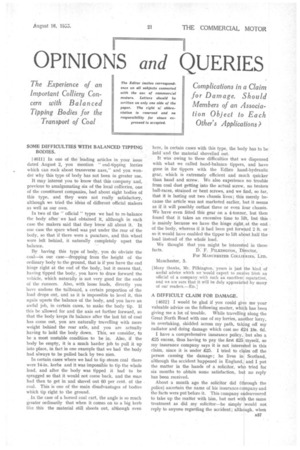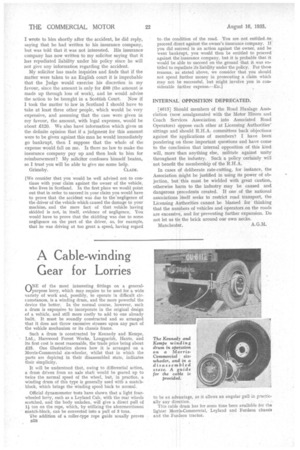OPINIONS and QUERIES
Page 47

Page 48

If you've noticed an error in this article please click here to report it so we can fix it.
The Experience of an Important Colliery. Concern with Balanced Tipping Bodies for the Transport of Coal Complications in a Claim for Damage. Should Members of an Association Object to Each Other's Applications?
SOME DIFFICULTIES WITH BALANCED TIPPING BODIES.
[4611] In one of the leading articles in your issue dated August 2, you mention " end-tipping lorries which can rock about transverse axes," and you. wonder why this type of body has not been in greater use.
It may interest you to know that this company and, previous to amalgamating six of the local collieries, one of the constituent companies, had about eight bodies of this type, and they were not really satisfactory, although we tried the ideas of different official makers as well as our own.
In two of the " official " types we had to re-balance the body after" we had obtained it, although in each case the makers said that they knew all about it. In one case the spare wheel was put under the rear of the body, so that if there were a puncture, and this wheel were left behind, it naturally completely upset the balance.
By having this type of body, you do obviate the coal—in our case—dropping from the height of the ordinary body to the ground, that is if you have the end hinge right at the end of the body, but it means that, having tipped the body, you have to draw forward the vehicle, which naturally is not very good for the ends of the runners. Also, with loose loads, directly you have undone the tailboard, a certain proportion of the load drops out, and as it is impossible to level it, this again upsets the balance of the body, and you have an awful job, in certain cases, to make the body tip. If this be allowed for and the axis set farther forward, so that the body keeps its balance after the last bit of coal has come out, you are naturally travelling with more weight behind the rear axle, and you are actually having to hold the body down. This, we consider, to be a most unstable condition to be in. Also, if the body be empty, it is a much harder job to pull it up into place, in fact in one example that we had the body had always to be pulled back by two Men.
In certain cases where we had to tip steam coal there were 14-in. kerbs and it was impossible to tip the whole load, and after the body was tipped it had to be spragged so that it would not come back, and the man had then to get in and shovel out GO per cent, of the coal. This is one of the main disadvantages of bodies which tip right to the ground.
In the case of a horsed coal cart, the angle is so much greater ordinarily that when it comes on to a big kerb like this the material still shoots out, although even here, in certain cases with this type, the body has to be held and the material shovelled out.
It was owing to these difficulties that we dispensed with what we called hand-balance tippers, and have gone in for tippers with the Edbro hand-hydraulic gear, which is extremely efficient and much quicker than hand and screw. We also experience no trouble from coal dust getting into the actual screw, no broken ball-races, strained or bent screws, and we find, so tar, that it is lasting out two chassis lives; this merely because the article was not marketed earlier, but it seems as if it will possibly outlast three or even four chassis. We have even fitted this gear on a, 4-tonner, but then found that it takes an excessive time to lift, but this is mainly because we have the hinge right at thefl end of the body, whereas if it had been put forward 2 ft. or so it would have enabled the tipper to lift about half the load instead of the whole load.
We thought that you might be interested in these
facts. D." F. PruciNGroti, Director, For MANCHESTER COLLIERIES, LTD. Manchester, 3.
[Many thanks, Mr. Pilkington,' yours is just the kind of useful advice which we would -expect to receive firnii an official of a company with such an excellent reputation, and we are sure that it will be duly appreciated by many, of our readers.--En.]
A DIFFICULT CLAIM FOR DAMAGE.
[4612] I would be glad if you could give me your valuable advice on the following matter, which has been giving me a lot of trouble. While travelling along the Great North Road with one of my lorries, another lorry, in overtaking, skidded across my path, taking off my radiator and doing damage which cost me £24 18s. 6d.
I have a comprehensive insurance policy, but also a £25 excess, thus having to pay the first £25 myself, so my insurance company says it is not interested in this claim, since it is under £25. I tried to claim off the person causing the damage; he lives in Scotland, although the accident happened in England, and I put the matter in the hands of a solicitor, who tried for six months to obtain some satisfaction, but no reply has been received.
About a month ago the solicitor did (through the police) ascertain the name of his insurance company and the facts were put before it. This company endeavoured to take up the matter with him, but met with the same treatment as did my solicitor—he simply would not reply to anyone regarding the accident; although, when
I wrote to him shortly after the accident, he did reply, saying that he had written to his insurance company, but was told that it was not interested. His insurance company has now written to my solicitor saying that it has repudiated liability under his policy since he will not give any information regarding the accident.
My solicitor has made inquiries and finds that if the matter were taken to an English court it is improbable that the Judge would exercise his discretion in my favour, since the amount is only for £60 (the amount is made up through loss of work), and he would advise the action to be brought in a Scottish Court. Now if I took the matter to law in Scotland I should have to take at least three other people, which would be very expensive, and assuming that the case were given in my favour, the amount, with legal expenses, would be about £120. We also have information which gives us the definite opinion that if a judgment for this amount were to be given against this man he would immediately go bankrupt, then I suppose that the whole of the expense would fall on me. Is there no law to make the insurance company pay up and then look to him for reimbursement? My solicitor confesses himself beaten, so I trust you will be able to give me some help.
Grimsby. CLAIM.
[We consider that you would be well advised not to continue with your claim against the owner of the vehicle, who lives in Scotland. In the first place we would point out that in order to succeed in your claim you would have to prove that the accident was due to the negligenceof the driver of the vehicle which caused the damage to your machine, and the mere fact of that vehicle having skidded is not, in itself, evidence of negligence. You would have to prove that the skidding was due to some negligence on the part of the driver, as, for example, that he was driving at too great a speed, having regard to the condition of the road. You are not entitled to proceed direct against the owner's insurance company. If you did succeed in an action against the owner, and he went bankrupt, you would then be entitled to proceed against the insurance company, but it is probable that it would be able to succeed on the ground that it was entitled to repudiate its liability under the policy. For these reasons, as stated above, we consider that you should not spend further money in prosecuting a claim which may not be successful, but might involve you in con, siderable further expense.—ED.J
INTERNAL OPPOSITION DEPRECATED.
[4613] Should members of the Road Haulage Association (now amalgamated with the Motor Hirers and Coach Services Association into Associated Road Operators) oppose each other at Licensing Authorities' sittings and should R.H.A. committees back objections against the applications of members? I have been: pondering on these important questions and have come to the conclusion that internal opposition of this kind will, more than anything else, militate against unity throughout the industry. Such a policy certainly will not benefit the membership of the R.H.A.
In cases of deliberate rate-cutting, for instance, the Association might be justified in using its power of objection, but this must be wielded with great caution, otherwise harm to the industry may be caused and dangerous precedents created. If one of the national associations itself seeks to restrict road transport, the Licensing Authorities cannot be blamed for thinking that the numbers of vehicles and operators on the roads are excessive, and for preventing further expansion. Do not let us tie the brick around our own necks.
Manchester. A.G.M.




















































































